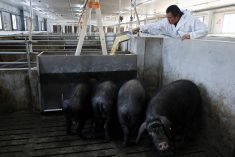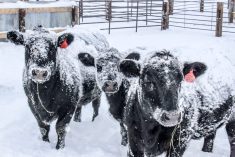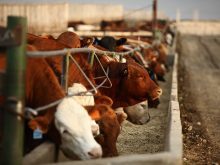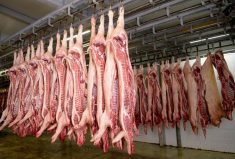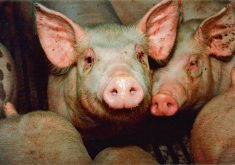Chicago | Reuters — The U.S. government will increase the number of dogs used to sniff out illegal pork products at airports and seaports in an effort to keep out a contagious hog disease that has spread across Asia and Europe, the U.S. Department of Agriculture said on Wednesday.
The disease, African swine fever, can kill hogs in just two days. China, home to the world’s largest hog herd, has reported more than 100 cases of the disease in 27 provinces and regions since last August. Efforts to contain the fever have disrupted Chinese pork supplies.
Read Also

How China plans to dominate global trade long after Trump
Beijing is exploiting Trump-era uncertainty to stitch its manufacturing base into the world’s biggest economic blocs, aiming to end decades of U.S. trade leverage.
The virus, which does not harm people, has spread to China’s neighbour, Vietnam. Eastern Europe has also suffered an outbreak and Belgium has found the virus in wild boar.
To prevent the disease from entering the United States, USDA said it will work with Customs and Border Patrol agents to add 60 beagle teams at key U.S. commercial ports, seaports and airports, for a total of 179 teams.
The dogs will help expand arrival screenings as U.S. authorities check cargo for illegal pork products and ensure that travelers who pose a risk to spreading African swine fever (ASF) receive extra inspections, according to USDA.
“We understand the grave concerns about the ASF situation overseas,” said Greg Ibach, the agency’s undersecretary for marketing and regulatory programs.
USDA will also ramp up inspections of facilities that feed garbage to livestock to ensure the waste is cooked properly to prevent potential disease spread, according to a statement.
Hogs can be infected by African swine fever by direct contact with infected pigs or by eating garbage containing meat and or meat products from infected pigs.
In Canada, the Canadian Food Inspection Agency has cautioned that people such as farm workers, exchange students or hunters who travel to ASF-infected countries could bring back contaminated food, clothing and/or equipment.
Visitors who have visited a farm in an ASF-infected country must not visit a pig farm in Canada for at least 14 days, CFIA says on its website.
Also, the agency warned, travellers neglecting to declare all animal and food products at the border may face fines of up to $1,300.
Livestock producers should only purchase swine feed from trusted sources that have appropriate biosecurity controls, the agency said.
Furthermore, while ASF isn’t present in Canadian wild pigs, CFIA said it’s considered good biosecurity practice for producers and swine pet owners to keep their animals away from any areas where they could come into contact with wild pigs.
— Reporting for Reuters by Tom Polansek in Chicago. Includes files from Glacier FarmMedia Network staff.






